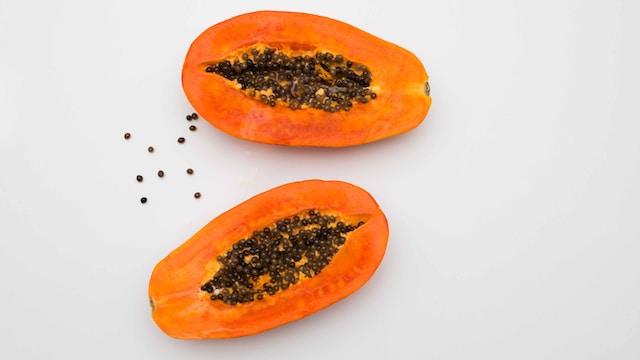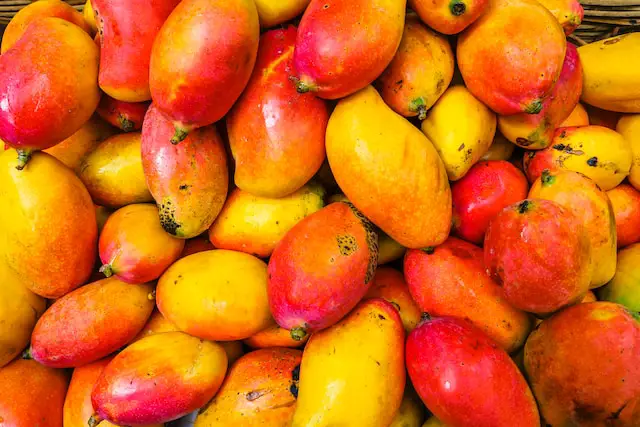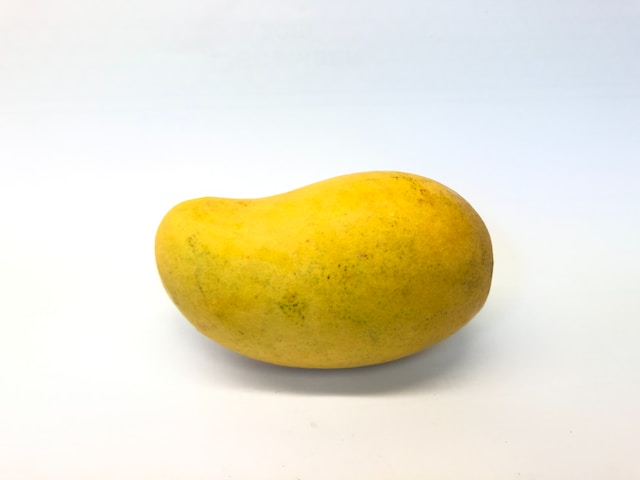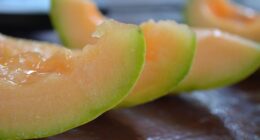Both fruits are sweet and often used in tropical desserts. However, mangoes are higher in sugar and calories than papayas. Papayas also have a higher vitamin C content than mangoes. papayas are generally sweeter than mangoes. Mangoes also have a stronger flavor that some people find more appealing than the milder taste of papayas.
What is papaya?
(Photo by Happy Surani on Unsplash )

Papaya is a tropical fruit that is native to Mexico and Central America. The papaya tree grows to about 20 feet in height and has a life span of around 10 years. The papaya fruit is typically round or oval in shape and has a yellow-orange flesh with black seeds in the center. Papayas are a good source of vitamins A and C, as well as fiber. They can be eaten fresh, juiced, or used in various recipes.
What is mango?
(Photo by Alexander Schimmeck on Unsplash )

Mango is a fruit that is grown on trees. The tree is native to India, but the fruit is now grown in many other countries as well. The tree grows to be about 30 feet tall and has a wide, spreading canopy. The leaves are dark green and glossy, and the flowers are white or yellow. The fruit of the mango tree is oval shaped and has a large, hard pit in the center. The skin of the mango can be either green, yellow, or red, and the flesh is orange or yellow. Mangos are often eaten fresh, but they can also be used in cooked dishes.
Papaya Vs. Mango – Key differences
Papaya and mango are two popular tropical fruits with several differences. Here are some of the key differences between the two:
Appearance: Papayas are oval-shaped with a green or yellow skin, while mangoes are round or oval-shaped with a yellow, orange, or red skin.
Flavor: Papayas have a sweet, musky flavor with a subtle tanginess, while mangoes have a sweet and fruity taste with a hint of tartness.
Texture: Papayas have a soft, creamy texture that is similar to that of a ripe avocado, while mangoes are juicy and fibrous.
Nutritional value: Papayas are a good source of vitamin C, folate, and potassium, while mangoes are rich in vitamin A, vitamin C, and potassium.
Culinary uses: Papayas are often used in fruit salads, smoothies, and desserts, while mangoes are used in a wide range of dishes including chutneys, salsas, curries, and desserts.
Both fruits are delicious and nutritious, but they have different flavors, textures, and culinary uses.
Health benefits of Mango
Mango is a delicious and nutritious tropical fruit that offers several health benefits. Here are some of the key health benefits of mango:
- Rich in vitamins and minerals: Mango is a good source of several essential vitamins and minerals, including vitamin C, vitamin A, folate, and potassium.
- Boosts immunity: The high vitamin C content in mangoes helps boost the immune system and protect against infections.
- Promotes digestive health: Mangoes are rich in fiber, which can help promote digestive health and prevent constipation.
- May lower cholesterol levels: Mangoes contain compounds that have been shown to help lower cholesterol levels and reduce the risk of heart disease.
- May have anti-inflammatory properties: Some studies suggest that mangoes may have anti-inflammatory properties, which may help reduce the risk of chronic diseases such as arthritis.
- May improve skin health: Mangoes contain antioxidants that can help protect the skin from damage caused by free radicals, and may help improve skin elasticity and reduce the signs of aging.
Mangoes are a delicious and nutritious fruit that offer several health benefits. Incorporating mangoes into your diet can help promote overall health and well-being.
Health benefits of Papaya
Papaya is a tropical fruit that is not only delicious but also offers several health benefits. Here are some of the key health benefits of papaya:
- Rich in nutrients: Papaya is rich in several essential nutrients, including vitamin C, vitamin A, folate, and potassium.
- Promotes digestive health: Papaya contains enzymes called papain and chymopapain, which can help break down proteins in the digestive system and improve digestion. Papaya is also rich in fiber, which can help prevent constipation.
- May lower inflammation: Papaya contains compounds that have been shown to have anti-inflammatory properties. This may help reduce the risk of chronic diseases such as heart disease and arthritis.
- May improve heart health: Some studies suggest that papaya may help improve heart health by reducing cholesterol levels, improving blood flow, and reducing inflammation.
- May have anticancer properties: Some studies suggest that papaya may have anticancer properties due to its high content of antioxidants and other beneficial compounds.
- May improve skin health: Papaya contains antioxidants that can help protect the skin from damage caused by free radicals, and may help improve skin elasticity and reduce the signs of aging.
Papaya is a delicious and nutritious fruit that offers several health benefits. Incorporating papaya into your diet can help promote overall health and well-being.
Which has more Fibre mango or papaya?
When it comes to fiber content, both mango and papaya are good sources of dietary fiber. However, papaya contains slightly more fiber than mango.
One cup of diced papaya (140 grams) contains approximately 2.5 grams of fiber, while one cup of diced mango (165 grams) contains approximately 2.0 grams of fiber.
Both fruits are an excellent addition to a healthy diet and can help promote digestive health due to their fiber content.
Can I drink water after eating mango or Papaya?
It is generally safe to drink water after eating mango or papaya. These fruits are not known to interact with water in a way that would cause adverse effects. However, it is important to note that these fruits are high in sugar content. Therefore, if you are drinking water immediately after consuming mango or papaya, it is best to do so in moderation. Drinking too much water too soon after eating these sugary fruits can cause an upset stomach.
What happens when you eat papaya or mango first thing in the morning?
When you eat papaya or mango first thing in the morning, your body gets an influx of nutrients and vitamins that help to jumpstart your day. Both fruits are excellent sources of antioxidants, which can help to protect your cells from damage and improve your overall health. Additionally, both fruits are high in fiber, which can help to keep you feeling full throughout the morning and improve your digestion.
Featured Image By – Becky Mattson on Unsplash








